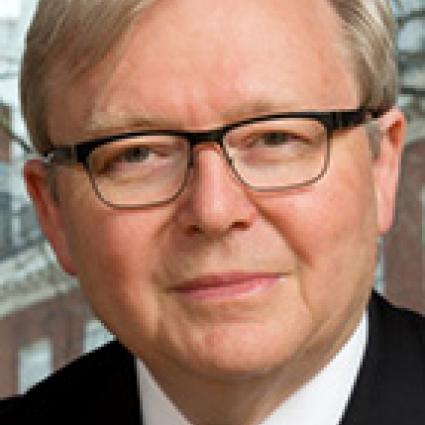Kevin Rudd served as Australia’s 26th Prime Minister from 2007 to 2010, then as Foreign Minister from 2010 to 2012, before returning to the Prime Ministership in 2013. Mr. Rudd is internationally recognized as one of the founders of the G20 which drove the global response to the economic crisis of 2008.
As Australia's Prime Minister and Foreign Minister, Mr. Rudd was active in global and regional foreign policy leadership. As a steward of environmental issues, Mr. Rudd ratified the Kyoto Protocol in 2007, legislated in 2008 for a 20% mandatory renewable energy target for Australia, and launched Australia’s challenge to Japanese whaling in the Southern Ocean. Mr Rudd also drove Australia’s successful bid for its current non-permanent seat on the United Nation’s Security Council and the near doubling of Australia’s foreign aid budget.
Domestically, Mr. Rudd delivered Australia’s first national apology to indigenous Australians as his first act as Prime Minister. His government introduced Australia’s first ever nation-wide school curriculum and legislated for the biggest school modernization and digital access programs in Australian history. In 2010, Mr. Rudd negotiated with the Australian states a National Health and Hospitals Reform Agreement, the biggest reform and investment in the health system in 30 years, and introduced Australia’s first ever paid parental leave plan. In defiance of Big Tobacco, his government introduced the world’s first plain-packaging standard for all tobacco products. He also established Australia’s first ever dedicated Australian Children’s Network.
Mr. Rudd is engaged in a range of international challenges and is on the International Advisory Panel of Chatham House. He is a proficient speaker of Mandarin Chinese, a Visiting Professor at Tsinghua University, and funded the establishment of the Australian Centre on China in the World at the Australian National University. He is a co-author of the report of the UN Secretary General’s High Level Panel on Global Sustainability, “Resilient People, Resilient Planet” and chairs the World Economic Forum’s Global Agenda Council on Fragile States. He also remains actively engaged in indigenous reconciliation.
